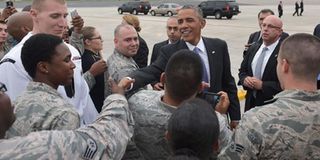Barack Obama says Ebola crisis 'spiralling out of control'

US President Barack Obama greets military personnel upon his arrival at MacDill Air Force Base in Tampa, Florida, on September 16, 2014. AFP PHOTO | MANDEL NGAN
What you need to know:
- The US will also set up a command and control center in the capital of Liberia, the hardest-hit country, build new treatment centers and train health workers.
- UN has set a goal of stopping the spread of Ebola within six to nine months.
US President Barack Obama issued a global call to action to fight West Africa's Ebola epidemic on Tuesday, warning the deadly outbreak was unprecedented and "spiralling out of control," threatening hundreds of thousands of people.
Speaking as he unveiled a major new US initiative which will see 3,000 US military personnel deployed to West Africa to combat the growing health crisis, Obama said the outbreak was spreading "exponentially."
"Here's the hard truth. In West Africa, Ebola is now an epidemic of the likes that we have not seen before," Obama said.
"It's spiralling out of control. It is getting worse. It's spreading faster and exponentially. Today, thousands of people in West Africa are infected. That number could rapidly grow to tens of thousands.
"And if the outbreak is not stopped now, we could be looking at hundreds of thousands of people infected with profound political and economic and security implications for all of us," he said.
As well as the military deployment, the US will also set up a command and control centre in the capital of Liberia, the hardest-hit country, build new treatment centers and train health workers.
Precise timing on deployment was still unclear.
"No deployment in the coming days. The troops have to be properly trained and equipped," a Pentagon official said privately.
Among the US soldiers sent to West Africa will be doctors and also engineers to set up the field hospitals, the official said.
Meanwhile, the United States moved to fund these plans.
Specifically, the Department of Defense plans to ask Wednesday to have reprogrammed "an additional $500 million in Fiscal Year 2014 Overseas Contingency Operations (OCO) funds to provide urgent humanitarian assistance to fight Ebola," an administration official said.
PUBLIC HEALTH CRISIS
This is separate from the funds already put toward the effort, including the $175 million already dedicated, and the $88 million requested through a continuing resolution.
The Ebola epidemic has killed more than 2,400 people in Guinea, Liberia, Nigeria and Sierra Leone this year.
The virus can fell its victims within days, causing severe fever and muscle pain, weakness, vomiting and diarrhea -- in some cases shutting down organs and causing unstoppable bleeding.
No licenced vaccine or treatment exists.
The United Nations Security Council is poised to adopt a resolution on Thursday exhorting countries to provide more field hospitals and urgent aid to the crisis-stricken region.
Likely passage of the resolution marks only the third time that the Security Council will vote on a public health crisis after resolutions on AIDS in 2000 and 2011.
"This has gone beyond health issues. It has gone to areas affecting social and economic situations. It may even affect political stability if not properly contained and treated," UN Secretary-General Ban Ki-moon said.
The United Nations said nearly one billion dollars would be needed to beat back the worst-ever outbreak of the disease, which is on track to infect 20,000 people by the end of the year.
The world body has set a goal of stopping the spread of Ebola within six to nine months but aid agencies are complaining that help has been too slow.
Ban is planning a "high-level event" on the sidelines of the UN General Assembly next week to draw attention to the crisis.
UN humanitarian chief Valerie Amos told reporters in Geneva the Ebola crisis faced a "huge funding challenge".
The capacity of Guinea, Sierra Leone and Liberia to provide even the most basic necessities is "on the brink of collapse", she warned.





